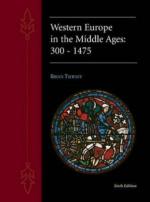|
This section contains 566 words (approx. 2 pages at 300 words per page) |

|
| 354 | Augustine of Hippo, who successfully reconciles Neoplatonism and Christianity, is born. |
| 525 | Boethius, the "last of the Romans," whose book struggling with the problem of evil fortune will influence generations of medieval thinkers, is executed for treason. |
| 800 | Charlemagne, whose establishment of cathedral schools will usher in a reformation of learning, is crowned the first emperor of the Romans. |
| c. 875 | John Scotus Eriugena, author of the first summa ("summary treatment") of theology, dies. |
| 950 | Alfarabi, a Muslim philosopher who first suggested the distinction between essence (what a thing is) and existence (that by which a thing is), dies in Baghdad. |
| 1033 | St. Anselm of Canterbury, who exhibited an "almost unlimited confidence" in the power of reason, is born. |
| 1037 | Avicenna, the most influential of Muslim thinkers, dies. |
| 1085 | The Christian reconquest of Toledo in Spain gives Western thinkers access to Arabic translations of Greek philosophy and science, including... |
|
This section contains 566 words (approx. 2 pages at 300 words per page) |

|




